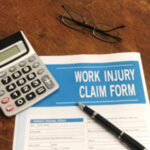Recent Blog Posts

Shoulder Injuries at Work in Maryland
Workplace accidents, and even routine work duties, can result in traumatic and stress-related injuries, which may be compensable through the Maryland workers’ compensation system. Shoulder injuries can occur as traumatic injuries in unexpected, single-event accidents, as well as a result of repetitive motion or repetitive stress. What should you know about shoulder injuries in… Read More »

Crush Injuries and Workers’ Compensation
The severity of any type of workplace injury in Maryland depends on the kind of injury, the location on the body, and the overall health and well-being of the injured worker. Some injuries by their nature tend to be disabling and often catastrophic. Crush injuries are one such type of injury. Crush injuries can… Read More »

Are All Workers in Maryland Covered by Workers’ Compensation?
If you were recently injured on the job, or if a spouse or family member got hurt while working, one of your first questions is likely going to be about compensation and workers’ compensation coverage. In short, it is critical to determine whether you are eligible for workers’ compensation benefits and to begin the… Read More »

Do I Need to Prove Fault in a Maryland Workers’ Compensation Claim?
After a workplace accident that results in an injury, getting the medical care you need and compensation for missed work is extremely important. For most injured workers, obtaining compensation will require seeking workers’ compensation benefits. Yet for many injured workers, this process can be confusing. Indeed, many injured workers are unsure about the steps… Read More »

Part-Time Teen Workers in Maryland
Whether it is over the summer or during the school year, many teenagers in Maryland work part-time jobs. Even though they may be at work for fewer hours each week than a full-time worker, they can also be at risk of suffering a job-related injury that can require days, weeks, or months away from… Read More »

SSD and Workers’ Compensation: How to Get Compensation After a Work Accident
After a work accident in Maryland that results in a serious injury, it is critical to understand your potential options for obtaining compensation if your injury is severe enough that you are unable to return to work. When an employee is involved in a workplace accident that results in a critical injury, they often… Read More »

Workers’ Compensation Claims for Psychological Injuries
Workplace injuries in Maryland can take a wide range of forms, but most of us think about physical harm when we consider traumatic accidents and long-term exposures in Maryland workplaces. However, as a report in Forbes makes clear, workplace mental health harm is commonly being identified as a leading type of workplace injury. Indeed,… Read More »

Electrical Injuries and Maryland Construction Work
Construction work in Maryland can be extremely dangerous for workers, even when appropriate safety measures are taken in advance. Given that construction workers often must perform job tasks at heights, using heavy equipment and machinery, and in highway work zones, there are various types of hazards to which construction workers are exposed. The Occupational… Read More »

Can I Appeal a Denied Workers’ Compensation Claim?
Many workers in Maryland who have been injured on the job file what they believe to be complete and accurate workers’ compensation claims only to be denied benefits. There are many reasons that benefits can be denied, and sometimes employers or insurance companies simply do not want to pay out legitimate claims. In other… Read More »

Workplace Injuries Caused By Violence
When most people think about workplace injuries in Maryland, they imagine accidents that result in traumatic injuries like broken bones or traumatic brain injuries, or exposure-related or repetitive-use injuries like carpal tunnel syndrome or hearing loss. Yet workplace injuries can also result from acts of violence — violence committed by other employees at the… Read More »


